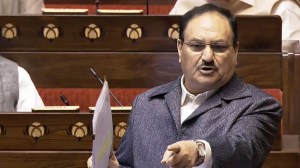Legal framework for detaining & deporting allegedly undocumented Bangladeshis: All you need to know
The Supreme Court has agreed to hear a PIL against the detention and deportation of allegedly undocumented Bangladeshi workers. Here’s what the law says
 The latest drive against allegedly undocumented immigrants from Bangladesh has now been challenged in the Supreme Court. (File)
The latest drive against allegedly undocumented immigrants from Bangladesh has now been challenged in the Supreme Court. (File)The Supreme Court last week agreed to hear a public interest litigation (PIL) seeking its intervention in the alleged detention of Bengali-speaking migrant workers in several states.
The PIL filed by West Bengal Migrant Workers Welfare Board had said in its petition that over a thousand Bengali migrant workers have been picked up between February and July by police in multiple states on the suspicion of being undocumented Bangladeshi immigrants
A Bench comprising Justices Surya Kant and Joymalya Bagchi issued notice to the Centre and nine states, seeking their response.
The case brings to the fore the legal framework that enables the state to question a person’s nationality, and the procedures established for identifying and deporting foreigners.
Defining a foreigner
The primary law governing the entry, presence, and exit of foreign nationals in India is the Foreigners Act, 1946. The law defines a “foreigner” as anyone who is not an Indian citizen, and grants the government authority to prohibit or restrict their movements and impose various conditions on their stay.
The Act, under Section 9 has a reverse burden of proof on a ‘foreigner’ to prove his credentials, saying that “ whether any person is or is not a foreigner… the onus of proving that such person is not a foreigner… shall notwithstanding anything contained in the Indian Evidence Act, 1872… lie upon such person”.
In other words, under the Act, if an authority questions an individual’s nationality, it is up to that individual to provide satisfactory proof that they are an Indian citizen. This essentially empowers law enforcement agencies to apprehend any person on suspicion of being a foreigner.
Proving citizenship
Proving citizenship is a straightjacket task. This is because there is no single document, like a citizenship card, for individuals who are citizens by birth.
Under the Citizenship Act, 1955, for an individual to be an Indian citizen by birth, he has to fall into one of three categories.
First, those born in India on or after January 26, 1950, but before July 1, 1987, are automatically deemed citizens.
Second, those born on or after July 1, 1987, but before the commencement of the Citizenship (Amendment) Act, 2003 (6 of 2004) will be deemed citizens only if either of their parents is a citizen of India at the time of their birth.
Third, those born after 2003 will be deemed citizens when both of their parents are citizens of India, or one of whose parents is a citizen of India and the other is not an illegal migrant at the time of their birth.
Over the years, courts, including the Supreme Court, have held that commonly used identity documents such as Aadhaar cards, voter identity cards, ration cards and Permanent Account Number cards are not conclusive proof of citizenship.
Rather, proving citizenship often requires a series of documents that establish birth in India and, for those born after July 1, 1987, the citizenship of one or both parents. This can include birth certificates, school records, and land documents.
What makes the process even harder is that India has a significant documentation deficit, especially among rural and marginalised communities. Many births, particularly before birth registration became stringent, were not officially recorded. Discrepancies in names and spellings across different documents further complicate the process for many, making it a complex task to prove they are Indian citizens.
MHA’s latest directives
On May 2, 2025, the Ministry of Home Affairs (MHA) sent a letter to all states and Union Territories, issuing “revised instructions” for the deportation of “illegally staying Bangladeshis/Rohingyas”. The letter instructs all state governments to set up a Special Task Force in each district to “detect, identify and deport/send back illegal immigrants”. It also asks states to establish “adequate Holding Centers in each District under the Police” to detain such individuals.
The most significant directive concerns the verification process. If a person apprehended on suspicion claims to be an Indian citizen from another state, the authorities of that state would have 30 days to verify their credentials. The letter states that during this period, the “suspected person shall be kept in the Holding Center.”
If no verification report is received within 30 days, the “Foreigners Registration Officer may take necessary action to deport/send back the suspected Bangladesh/Myanmar national.” The instructions also mandate capturing the biometrics of identified illegal immigrants and publishing a list of deportees on a public portal to prevent them from obtaining Indian documents in the future.
Deportation process
Deportation of illegal foreigners has traditionally followed a multi-step process.
In Assam, foreign nationals caught without valid documents are first prosecuted by tribunals set up under the Foreigners (Tribunals) Order, 1964. These tribunals determine whether a person is a foreigner or not. The order says that the tribunal would give the person a “reasonable opportunity to represent his case.” In April 2012, the 1964 order was amended, requiring that the tribunals dispose of cases within 60 days.
In other states, according to their police manuals, foreign nationals may only be deported on an order of deportation made under the Foreigners Act. The power to identify illegally staying foreign nationals and issue such orders lies with state governments, as per a 2014 response by the MHA to an application under the Right to Information Act. These foreigners must be detained in holding or detention centres “[t]ill their nationality is verified and travel documents are issued”, the MHA informed the Lok Sabha in March 2020.
According to police manuals, the order of deportation must be served to the person being deported. After the foreigner has been deported, the representative of the country of the foreigner must be informed.
The MHA called this a “continuous and ongoing statutory process” in 2020. Its May notification is more fast-tracked- the 30-day deadline means a person can be deported not because of an order of deportation, but because of an administrative delay in verification. This raises questions about due process.
Grounds for legal challenge
The PIL filed in the Supreme Court challenges the legality of this new procedure.
The petition argues that the MHA circular is unconstitutional as it violates the fundamental rights to life, liberty, and equality guaranteed under the Constitution. It also contends that the Foreigners Act does not give the government the authority to detain people on suspicion that they are foreigners.
The plea specifically targets the arbitrary power given to the police and the 30-day deadline, which, it argues, creates a situation where an individual can be deemed a foreigner and deported without due process of law.
- 01
- 02
- 03
- 04
- 05






































